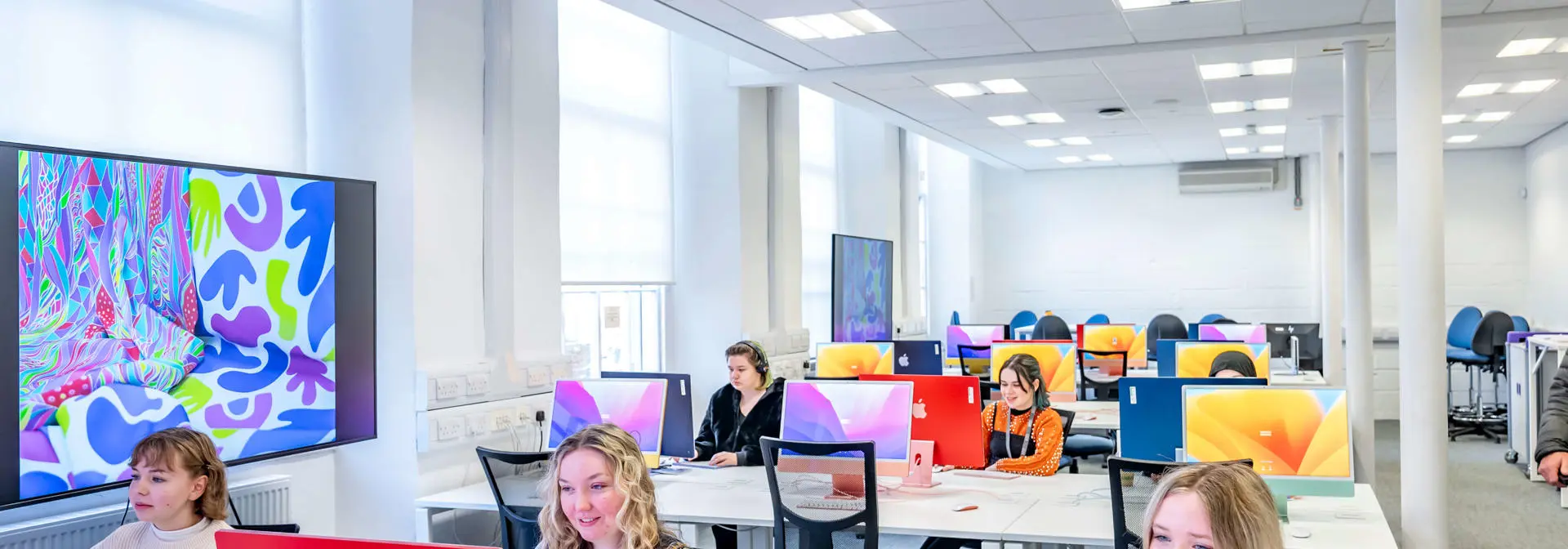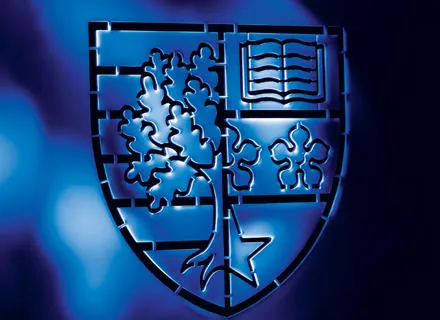Key information
Approach communication design by analysing collaborative experiences, socially dynamic and inclusive agendas, and key forms of critical design research.
Find out more about our 3 year honours degree option.
- Programme code
- W6CD
- Level
- Undergraduate
- Delivery type
- Full Time
- Degree qualification
- BA (Hons)
- Mode of delivery
- On-Campus
- Duration
- 3-4 years
- Location
- Scottish Borders
- Start date
- September
Our BA (Hons) Communication Design will provide you with expertise in three key areas of design; conceptual, applied, and entrepreneurial practices to communicate information through a variety of media. The programme will encourage you to use design thinking to transform and interpret data, develop knowledge, and transform information into ethical, meaningful, and inclusive communication design experiences.
You’ll approach communication design by analysing collaborative experiences, socially dynamic and inclusive agendas, and key forms of critical design research. You’ll gain experience in moving image and animation, photography, graphic design (including illustration), and interaction design (UX/UI/Experiential). This will establish your communication design skills across various creative approaches, making you highly employable and sought-after upon graduation.
The programme offers specialised modules in communication design and various related topics. You’ll develop and apply your learned skills, techniques, and knowledge to undertake your final year project and establish your interests within the industry. There may be an opportunity for you to gain a global perspective of communication design, by studying abroad at our international exchange partners in Europe, India, and the USA.
Upon completion of the programme you’ll be able to maintain a sustainable practice in the management of design and design research projects and communicate critically and effectively to individuals and organisations, through professional visual, written, and verbal presentations. You’ll develop the necessary skills and knowledge to develop critical communication design practices within a variety of industry, commercial, and non-commercial contexts.
Your student experience
Your learning will be informed by our design faculty and staff, whose work covers many key areas including:
- 3D and Motion
- Advertising and Communication
- Animation (2D and 3D)
- Artificial & Virtual Reality
- Branding
- Film and Videography
- Immersive Design
- Infographics and Data Visualisation
- Packaging Design
- Photography
- Publication Design
- Retail Design
- Signage and Wayfinding
- Social Media
- UI/UX Design
Go Global
With Go Global, Heriot-Watt's global student programme, you can carry your studies to new places and experience new cultures, expanding your horizons on the way. You'll discover what it means to be a true global citizen and emerge prepared for wherever your career journey will take you.
Inter-Campus Transfer: Dubai
Course content
September Intake
Year 1
The first year focuses on initial design and visualisation skills setting up the student with the fundamentals in overall photography, visual development, design thinking, and introductions into illustration.
Mandatory September
- Rethinking Design 2: Develop and Deliver
- Rethinking Design 1: Discover and Define
Mandatory January
- Introduction to Communication Design
- Introduction to Creative Media
- Introduction to Photography
Year 2
The second year builds upon the fundamentals taught in first year, by introducing specialist topics such as typography, videography, and advertising. This is supplemented with courses in creative writing, professional practice, and graphics.
Mandatory September
- Intermediate Photography
- Creative Digital Technologies
Mandatory January
- Promotion & Advertising
- Graphic Design, Typography & Illustration
Year 3
The third year develops a unique series of four themed elective specialisations in design management, fashion communication, interaction design, and graphics and illustration. However, we will intitially be introducing just one pathway in graphics and Illustration. These third year courses include events management, visual merchandising and fashion styling.
Mandatory September
- Art Direction and Storytelling
- Design Branding
Mandatory January
- Advanced Communication Design
- Collaborative Studio
Year 4
The final honours year will entail a two semester developed honours project using supervisory pedagogies, being supplemented by advanced evaluative practice and review.
Mandatory September
- Final Project 1
- Minor Project
Mandatory January
- Final Project 2
- Advanced Practice and Evaluation
Disclaimer
The courses mentioned above may change between now and the time that you study. For more information, please view our Terms and Conditions.
Programme Video
Design & Communication at Heriot-Watt
Heriot-Watt students and academics explore the importance of Design and Communication. Understand how the programme focuses on how to solve the problems of the future, connecting with audiences, sustainability, and new strategies. Experience what studying Design and Communication at Heriot-Watt can offer you.
Teaching staff
The BA (Hons) Communication Design programme encourages students to become informed, adaptable and creative practitioners who work across diverse channels and opportunities, to show the importance of thoughtfully designed solutions and how they can impact the world in which we live. Producing graphic, environmental, experiential and dynamic solutions to the problems and challenges of our age, our students are designers and thinkers who can make unique insightful connections through their work to convey messages and meanings in highly creative ways.
Fees and funding
| Status | Fee |
|---|---|
| Scotland | Paid by SAAS |
| England / Wales / N Ireland / Rep of Ireland | £9,790 |
| International | £20,080 |
- Status: Your residency status is usually defined as the country where you have been ordinarily resident for the three years before the start of your course.
- International: 'International' includes applicants from European Union countries who do not hold Pre-Settled or Settled status in UK. (This does not include students from the Republic of Ireland - see above).
Scholarships and bursaries
Bursaries for students from England, Northern Ireland or Wales
In addition to government loans and grants towards the costs of fees and living costs, we are offering generous financial support to attract and support eligible undergraduate students from England, Northern Ireland or Wales:
- Heriot-Watt University Bursary (up to £3,100 per year)
Entry requirements
We have standard entry requirements for all of our courses that you will have to meet.
Year 1
Standard entry requirements
- Highers BBBB (over two sittings)
- A-Levels BCC and successful digital portfolio
- International Baccalaureate 29 points
- BTEC Extended Diploma DMM
- HNC C in graded unit
- HND CC in graded units
- Please check that you meet our University-wide National 5/GCSE (or equivalent) English and Maths requirements.
- This programme requires all applicants to submit a Digital Portfolio. Please see ""Additional Information"" for further details.
Minimum entry requirements *
- Highers BBBC (over two sittings)
- A-Levels BCC
- International Baccalaureate 29 points
- BTEC Extended Diploma DMM
- HNC C in graded unit
- HND CC in graded units
*Minimum: under our Fair Access Policy, we will relax our standard entry requirements for some Scottish and Rest of UK status students depending on their circumstances. Our minimum requirements will apply if you:
- live in an area within the Scottish Index of Multiple Deprivation lowest 20% (SIMD20) or POLAR4 Quintile 1 regions (RUK)
- or are care experienced.
We can also make exceptions for some Scottish students with grades above minimum but below standard. Read more about our Minimum and standard entry requirements.
Year 2
- Advanced Highers BB (plus BBBB at Higher)
- A-Levels BBC and successful digital portfolio
- International Baccalaureate 30 points.
- BTEC Extended Diploma DMM in a relevant subject
- HNC B in graded unit with 120 SCQF credit points in a relevant subject
- HND BB in graded units in a relevant subject
- This programme requires all applicants to submit a Digital Portfolio. Please see ""Additional Information"" for further details.
Year 3
- HND BB in graded units in a relevant subject. E.g. Computer Arts, Visual Communication, Visual Communication with Graphic Design / Illustration / User Experience.
- This programme requires all applicants to submit a Digital Portfolio. Please see "Additional Information" for further details.
Additional information
- For all years, applications are welcomed from holders of non-school qualifications, mature candidates and overseas students.
- If you do not see your qualifications here please contact us at studywithus@hw.ac.uk.
- For applicants studying HNC, HND or BTEC qualifications, when submitting your application please ensure you list in full all the units you are currently studying, as specific units may be required.
Digital portfolio
All prospective students are required to provide us with a portfolio when applying.
In some circumstances, upon reviewing your portfolio, an academic member of staff may contact you to discuss your portfolio further. Online portfolio feedback sessions with an academic will be offered following your submission.
Your portfolio should consist of examples of complete (or ongoing) creative projects and demonstrate a range of skills and competencies including:
- Research and investigation
- Design development and iteration
- Technical skills
- Visual communication and presentation
Your portfolio submissions should be in PDF format with between 10 and 20 images with some explanatory text and full image captions. You can additionally include hyperlinks to other sites that are relevant to your work.
In each portfolio, we are looking for evidence of original thinking. This may be demonstrated through photographs, drawing, or other media. The portfolio should show a progression of your ideas, like a storyboard, rather than a finished piece of work, as the portfolio is intended to demonstrate your ability to think through an idea and show the progression of your thoughts.
All work must be created by you. If you have used AI in any way, this should be clearly referenced/credited.
English language requirements
If your first language is not English, we'll need to see evidence of your English language ability.
The minimum English language requirement for entry to this programme is IELTS 6.0 (or equivalent) with no score lower than 5.5.
If you do not have IELTS 6.0, we offer a range of English language courses to help you meet the English language requirement for this programme prior to commencing your studies.
Please see our detailed English language requirements.
Why Heriot-Watt
We're the top university in Scotland for graduate outcomes which means that more of our graduates are employed or in postgraduate education than any other institution in the country and we ranked 5th in the UK.
We're also rated number one in the UK for CEO or MD roles, meaning more of our graduates go on to become CEOs or MDs than any other university in the whole of the UK. On top of that, we have beautiful campuses, across the globe, so you'll get a truly international education. Our Edinburgh Campus is home to Oriam, Scotland's National Sports Performance Centre combined with plenty of wellbeing resources, prioritising fitness and mental health for all students. Our Global Research Institutes look at solving real world issues such as climate change and saving our oceans as well as working on the next medical technological breakthrough and the future of AI and robots.
Student life
Explore facilities, and chat to staff and students
Discover Uni course data
Discover Uni provides data on each university's degree courses across a range of measures including student satisfaction, graduate jobs and salaries.








